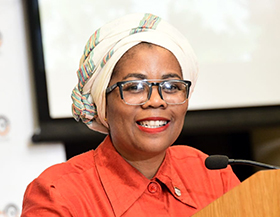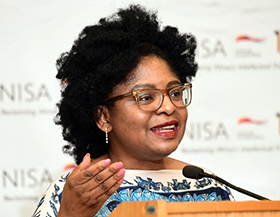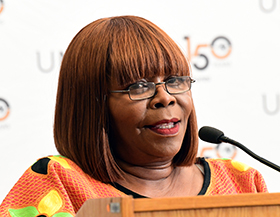News & Events
Reviving OR Tambo’s dream for Africa
The Unisa Gauteng Region hosted the 3rd Annual Oliver Reginald Tambo Memorial Lecture on Friday, 27 October 2023, at its Muckleneuck Campus. Themed Reclaiming Africa’s Intellectual Futures, this lecture focused not only on Tambo’s visionary leadership and fight against oppression from the apartheid government, but also on his passion for Africans to be knowledgeable and educated whilst fighting against colonisation and apartheid.
Erin Naudé, Acting Regional Director: Gauteng Region, in setting the scene, stated that this event underscores the university’s unwavering commitment towards preserving and cherishing the values and principles of Oliver Tambo, and his enduring dedication and commitment to the cause of justice, equality and the pursuit of freedom. She affirmed that Unisa is honoured to host this annual lecture together with the Oliver & Adelaide Tambo Foundation, to highlight Tambo’s aspirations in reclaiming Africa’s intellectual futures.

Prof Puleng LenkaBula
In her welcome address, Professor Puleng LenkaBula, Unisa Principal and Vice-Chancellor (VC), welcomed the attendees comprised of diplomats and embassy representatives, including local and international dignitaries and the OR Tambo family. The VC stated that the 3rd Annual OR Tambo Memorial Lecture is a momentous occasion in the history of the university, not only taking place during Unisa’s 150th anniversary, but also during what would have been Tambo’s 106th birthday. In addition, the VC acknowledged Tambo as the longest serving president of the continent’s oldest liberation movement, the African National Congress.
“Unisa is the first university in the world to practise distance education, and 147 years later it was followed by others in the aftermath of COVID-19,” said the VC, adding that this model has become an important offering in the global arena of higher education, to make knowledge and education accessible to everyone regardless of their background. “These,” she said, “are the principles with which Tambo would align himself for the benefit of society.”
The VC continued: “We are reclaiming Africa’s intellectual futures. We do so with the understanding that Africa’s philosophies, civilisations, insights, and solutions are not acknowledged in the global arena. Just recently, President Cyril Ramaphosa led a delegation comprised of other African heads of state to Ukraine to offer solidarity and peace, and not ammunition.” This, she said, bears testament to the ideals that South Africa and the diplomacy that Tambo stood for, continue to be expressed.
The VC affirmed that the university takes interest at the humanising values that Tambo championed through his remarkable life, and that his enduring dedication to the cause of justice, equality, and the pursuit for freedom continues.
The VC stated that Unisa Chancellor, Dr Thabo Mbeki, worked closely with Tambo for decades. She said the Chancellor described Tambo as an intellectual, having reason and personal thought – a leader who could deal with both the concrete and the abstract, and discern between theory and practice.
“Today in Africa we need more OR Tambos to respond to the questions of our times,” she concluded. “Therefore, it is incumbent upon this generation to emulate the examples of Tambo and to do better than his generation.”

Khumbudzo Ntshavheni
Reclaiming the future, recognising the past
Khumbudzo Ntshavheni, Minister in the Presidency, delivered the keynote address themed Reclaiming Africa’s Intellectuals. Ntshavheni acknowledged the continent’s significant history in knowledge and innovation but lamented the setbacks resulting from wars and colonisation. She continued: “30 years after OR Tambo’s passing, Africa is still fighting for its freedom from wars and economic subjugation. Africa, often referred to as the cradle of humanity, boasts a rich history of intellectual achievements that spans millennia. From the great libraries of Timbuktu to the advanced medical knowledge of ancient Egypt, Africa has been a wellspring of innovation, wisdom, and progress. However, history has witnessed moments of exploitation, colonisation, and systemic neglect that have robbed the continent of its intellectual glory.”
Ntshavheni explained that the dark chapters in Africa’s history have overshadowed the intellectual achievements of African societies. However, she added that it is important to move beyond this historical burden and recognise the intellectual traditions that existed long before external influence. She continued: “It is high time we acknowledge and amplify the voices of African intellectuals, scholars, and visionaries, and recognise their critical role in shaping the continent's future.”
“Since we cannot reclaim the future without acknowledging the past, this may require the re-writing of Africa’s intellectualism including amplifying the contributions of Timbuktu to global intellectualism, particularly during the height of the Mali Empire in the 14th and 15th centuries,” said Ntshavheni. Furthermore, she acknowledged the contributions made by Timbuktu, which, she said, became a renowned centre of learning, with numerous universities and libraries. Ntshavheni stated that Timbuktu attracted scholars and students from various parts of Africa and beyond, adding that it was home to a collection of manuscripts, many of which contained valuable knowledge on subjects such as mathematics, astronomy, medicine, and literature. “These manuscripts were meticulously preserved with the contribution of the university’s Chancellor, Dr Thabo Mbeki,” she continued.
Ntshavheni remarked that African intellectuals have made significant contributions to various fields, from literature to science and technology, and that they have left an indelible mark on the world. She stated that they must be recognised and celebrated not as exceptions but as part of a larger tradition of African intellectualism. She continued to name some the remarkable Africans who have made outstanding contributions in their respective fields. These include:
- Ismail Mustafa al-Falaki (1825–1901), Egyptian astronomer and mathematician.
- Nashwa Eassa - the nano-particle physicist from Sudan
- Sydney Brenner (1927–2019), South African biologist, who won the 2002 Nobel Prize in Physiology or Medicine.
- Thebe Medupe (born 1973), South African astrophysicist and founding director of Astronomy Africa
- Chimamanda Ngozi Adichie (born 1977), Nigerian writer whose works range from novels to short stories to nonfiction
For the ideals of reclaiming Africa’s intellectuals, Ntshavheni stated that there must be the following: an investment in quality education, preservation of cultural heritage, promotion of research and innovation, advocacy for inclusivity and gender equality, and engaging with the African diaspora.
Africa has a lot to offer to the world
Ntshavheni remarked that Africa has a wealth of untapped potential in the fields of science, technology, and innovation, and encouraging research, providing support for inventors and entrepreneurs, and creating an environment that fosters innovation, will allow Africa to compete on a global scale
Ntshavheni stated that reclaiming Africa's intellectual futures is not just an aspiration; it's an imperative. She explained that the world is changing rapidly, and Africa must take its place in shaping the future. “As we move forward, let us remember that Africa's intellectual legacy is not just about the past; it's about the present and the future,” she concluded.

Nomatemba Tambo
Education: a weapon to fight injustice
Nomatemba Tambo, OR Tambo’s daughter and South Africa’s Ambassador to Italy, stated that throughout her father’s life, he used education as the bedrock to fight injustices brought by the apartheid regime. She added that many who participated in the 1976 youth uprisings left the country, and spread to different parts of the world to continue fighting against the apartheid regime.
She continued: “My father, being an educationalist, and strategic thinker, said that he also wanted them to fight against the apartheid government, but stated that they should rather use education as a weapon of war, so that when they take the country back, they will be able to show the apartheid government that they know more than they do, and that they will run the country the way they want it to be run.”
“It was not enough for him to know something, he had to know it best and be the best at it,” said Nomatemba. In quoting the message engraved on the grave of her mother, Adelaide Tambo, Nomatemba said: “Our fight is not quite done. Let us fight for the right to be literate, questioning, educated. Only then will we truly be able to claim that we have won our liberty. Education, education, all the way,” she concluded.
#Unisa150
*By Godfrey Madibane, Acting Journalist, Department of Institutional Advancement
**Photography by Given Maluleka, Multimedia Centre
Publish date: 2023/10/31
